IN 61AD, the Isle of Anglesey was bathed in blood, and the air was alive with screams as the swords, spears, and shields of a well-drilled legion of Roman soldiers indiscriminately hacked and cut down every man, woman, or child they found there.
Their fury was calculated, measured, and disciplined.
Their battle standards stood tall and unforgiving in the breeze as their sandalled feet trampled over the mounds of bloodied and mutilated corpses.
With the slaughter at an end, their commander, Suetonius Paulinius ordered his soldiers to destroy all the island’s sacred groves and holy oaks in a baptism of fire.
However, the warriors from the ‘Eternal City’ were unable to see the destruction through to the bitter end. Queen Boudicca had started her rebellion in Colchester, and every available legionary was needed to help quell the uprising.
Yet the damage had been done.
Britain’s last remaining and most important Druidic stronghold had been destroyed.
The Isle of Anglesey, or as the Romans called it, the Isle of Mona was hugely symbolic and important to the pagan religion and their holy men.
The Druids had been a thorn in the invading Romans’ side since the invaders had first set foot on the shores of this green and pleasant land some 100 years earlier.
Now, Emperor Nero had done what Julius Caesar and Claudius could not, he had crushed the Druids.
As the Roman historian Tacitus observed, “On the coastline, a line of warriors of the opposition was stationed, mainly made up of armed men, amongst them women, with their hair blowing in the wind, while they were carrying torches. Druids were amongst them, shouting terrifying spells, their hands raised towards the heavens, which scared our soldiers so much that their limbs became paralysed. As a result, they remained stationary and were injured. At the end of the battle, the Romans were victorious, and the holy oaks of the druids were destroyed.”
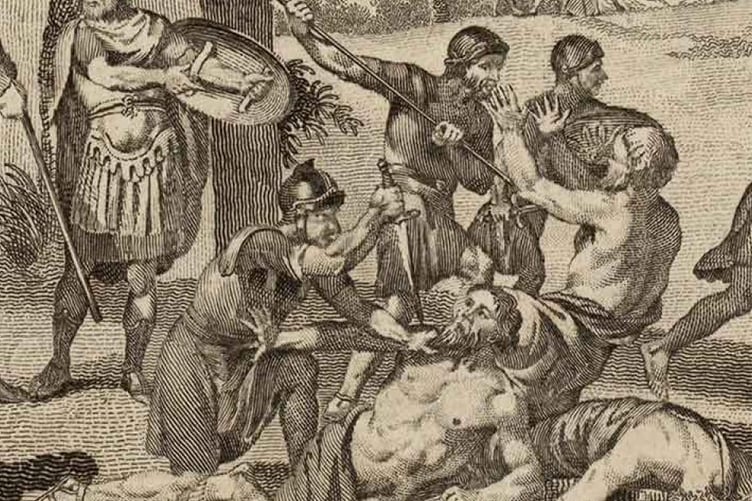
The Romans had long realised that without Anglesey, where acolytes would train for decades to master the secret ways and oral traditions of the Druids, the Celts, particularly in Wales, would be easier to conquer.
The reasoning being that if you cut off a people from the keepers of their history, their customs, their spiritual practices, and way of life, then chaos would ensue.
And as any well-drilled military outfit knows. When there’s chaos in the enemy ranks, all you need to do is keep your head and cut through them like a hot knife through butter.
When Wales lost its Druids, it lost the war.
A little over 30 years later, the Romans had defeated most of the native tribes in Wales.
The Second Augustan Legion built its fortress on the banks of the River Usk and named it Isca Silurum. It’s now known better as Caerleon.
Abergavenny, Usk, and Monmouth were all Romanised, and the Druids and their ways became little more than a whisper on the wind of what once was.
Not as much is known about the Druids as there should be. Classical commentators from antiquity have a lot to say about them, and they appear regularly in Welsh and Irish mythology, but there’s nothing from the horse’s mouth, so to speak.
The Druid’s long-term habit of not writing things down and relying on an oral tradition to impart knowledge means that although their wisdom is safe from Chat GPT and its army of plagiarising prompters, it is also lost to history.
If you mention the word Druid nowadays, it’s difficult to escape the image of slightly annoying types in robes hanging around sites such as Stonehenge, chanting gibberish and acting all mystical.
Here in Wales, of course, we have men and women from all walks of life who often adorn robes of all colours and hues for the National Eisteddfod, and call themselves Druids for the duration.
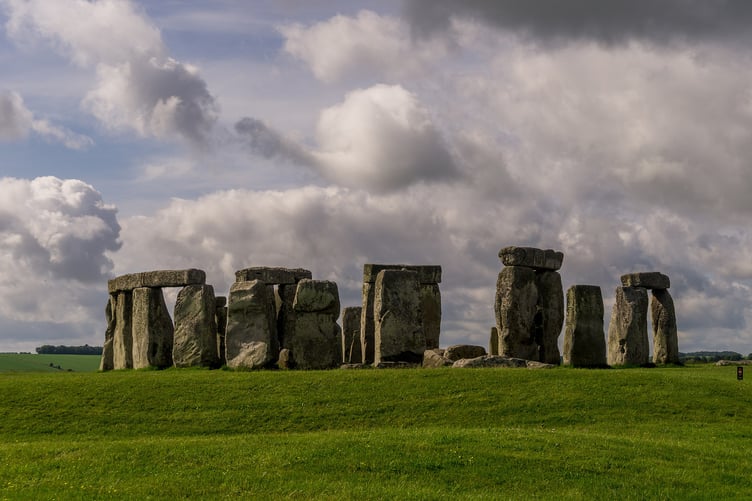
Yet it’s difficult to imagine the likes of Julius Caesar or Emperor Claudius seeing this lot as a substantial threat to the formidable and merciless might of the Roman war machine.
So, who were the Druids?
The name is thought to come from a Celtic word meaning ‘oak-knower.’ The oak tree was sacred to the Celts, and the reason why the Romans were so keen to burn any woodland at Anglesey to the ground.
However, in recent years, some scholars have argued that the word ‘Druid’ means ‘Wisdom.’
In Natural History XVI, 95, Pliny further muddies the field when he writes, “The magicians perform no rites without using the foliage of these trees (oaks). It may be supposed that it is from this custom that they get their name of Druids, from the Greek word meaning ‘oak.’”
The classical commentator Pomponius Mela branded the Druids as ‘magistri sapientiae’ (masters of wisdom), and Ammianus writes they were concerned not so much with everyday life but, “problems of things secret and sublime.”
Clement of Alexandria even suggested that the origins of philosophy could be traced to the Celtic world and the Druids. Although the Alexandrians as a whole still had a habit of considering Celtic people as ‘Noble Savages.’
In his Library of History, Diodorus Siculus writes, “Philosophers and men learned in religious affairs are unusually honoured among them and are called by them Druids. They further make use of seers, thinking them worthy of high praise. These latter by their augural observances and by the sacrifice of sacrificial animals can foretell the future, and they hold all the people subject to them….And it is a custom of theirs that no one should perform a sacrifice without a philosopher.”
Although the Romans had a tendency to ham up the Druids' practice of bloodthirsty sacrifice in an attempt to assuage their consciousness about the systemic slaughter and callous indifference that goes hand in hand with colonialism on a grand scale, the Druids did practice ritual sacrifice.
Yet they were also guardians of the supernatural world, poets of prophecy, makers of policy, and grand keepers of the oral tradition.
They worshipped a pantheon of natural gods and goddesses that they saw in the forests, fields, mountains, meadows, seas, streams, sun, moon, and stars, and they were feared and venerated in equal measure, much like the prophets of the Old Testament.
The poet and artist William Blake saw himself as something of a druid, and he referenced them constantly in his Prophetic Books written between 1797 and 1804.
He counted Noah, Abraham, and Shem from the Old Testament amongst their number and believed they were philosophers, priests, and law givers who had their origin in Britain but whose teachings spread far and wide in the ancient world.
On account of his Druid faith, Blake even refused to take the Oath at Chichester Assizes.
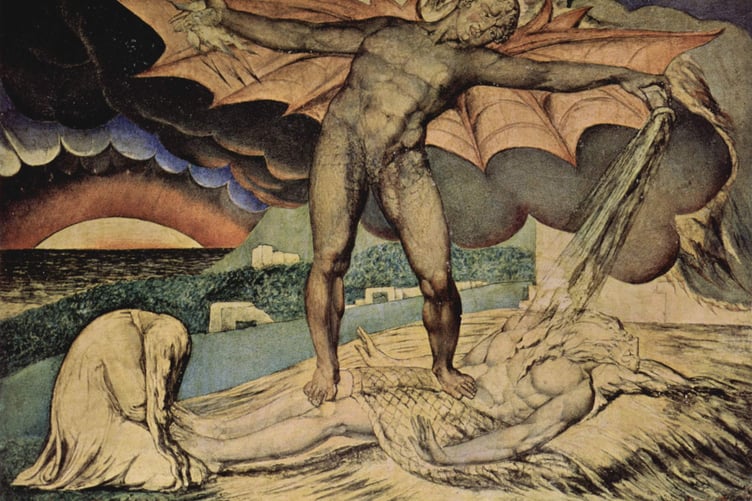
It’s perhaps Julius Caesar’s account of the Druids he encountered as governor of southern Gaul in 59 BC that paints the fullest picture.
Caesar writes, “Throughout Gaul, there are two classes of men of some dignity and importance. One of the two classes is that of the Druids, the other that of the knights. The Druids are concerned with the worship of the gods, look after public and private sacrifice, and expound religious matters. A large number of young men flock to them for training and hold them in high honour. For they, have the right to decide nearly all public and private disputes, and they also pass judgment and decide rewards and penalties in criminal and murder cases and in disputes concerning legacies and boundaries.
“When a private person or a tribe disobeys their ruling, they ban them from attending sacrifices. This is their harshest penalty. Men placed under this ban are treated as imperious wretches; all avoid them, fleeing their company and conversation, lest their contact bring misfortune upon them; they are denied legal rights and can hold no official dignity.
“It is thought that the Druidic system of training was invented in Britain and taken over from there to Gaul, and at the present time, diligent students of the matter mostly travel there to study it.
“The Druids are wont to be absent from war, nor do they pay taxes like the others. It is said that they commit to memory immense amounts of poetry. And so some of them continue their studies for 20 years. They consider it improper to entrust their studies to writing. I think they established this practice for two reasons because they were unwilling first, that their system of training should be bruited abroad among the common people, and second, that the student should rely on the written word and neglect the exercise of his memory.
“They are chiefly anxious to have men believe the following: that souls do not suffer death, but after death pass from one body to another; and they regard this as the strongest incentive to valour, since the fear of death is disregarded. They have acquired much knowledge of the stars and their motion, of the size of the world and of the earth, of natural philosophy, and of the powers and spheres of action of the immortal gods, which they discuss and hand down to their young students.”
If you’ve got a feeling you were a Druid in a previous life, then you could be on to something, because, as Julius and others tell us, if there’s one thing the cool Drudes believed in, it was reincarnation.
The Roman poet Lucan wrote, “The Druids hold that the soul of a dead man does not descend to the silent, sunless world of Hades, but becomes reincarnate elsewhere; if they are right, death is merely a point of change in perpetual existence.”
Classical scholars seemed in agreement that Druids were by and large contemptuous of those who feared death and they believed wholly in the immortality of the soul.
In 19th-century Llantrisant, not just a Druid was reincarnated but the whole of Druidism enjoyed something of a resurrection thanks to flamboyant free thinker Dr William Price.
The son of a Reverend would go on to become an acclaimed surgeon. However, his eccentric and mercurial soul would find greater fame as an individual who would dress as a Druid and hold Druidic rituals at the rocking stone just outside Pontypridd.
The Chartist supporter was revolutionary in that he wore his hair in long plaits, adopted a vegetarian diet, and had the habit of running stark naked across the Pontypridd hills.
When his son Iesu Grist (Welsh for Jesus Christ) died aged just five months, he angered the Llantrisant locals by dressing in Druidic robes and having his son cremated just as chapel services in the town were coming to an end.
Cremation was not just illegal, he locals saw it as sacrilege, and Price was later arrested and charged. Yet during a very public trial, he was acquitted, and that decision was largely responsible for the passing of the Cremation Act in the UK.
You can thank the man who would be a Druid for the right to have your body burned as opposed to being eaten by worms.
During his own cremation on January 23, 1893, over 20,000 people flocked to his burning and drank Llantrisant dry.
The people were drawn to their Druid. Dr William Price’s way of being and way of living had reignited a spark that had long lain dormant in the Welsh soul.
So when you light a pumpkin this Halloween, light one in memory of the Druids.
Because before October 31 became a time of witches, vampires, werewolves, zombies, and crass commercialisation, it was a deeply significant date in the Celtic calendar.
Samhain, as it was once known, marked the beginning of the Celtic New Year, but it runs a little deeper than that.
The harvest was over, and the world had begun to fade into darkness. Winter, or the season of death, was coming.
And the only thing to do when the shadows fell and to prevent the hopelessness that seemingly lay at the end of all things from devouring you whole was to do what humanity has been doing for centuries - shine a light in the dark!
Under the Druids' watchful eyes, bonfires were burned, lanterns were lit, rituals were followed, pacts were made, promises were kept, ancestors were honoured, dances were danced, and traditions were observed.
In the cold, stark Autumn twilight, the boundaries that lay between this world and the next had become a little blurred. It was possible during such a time for the dead to commune with the living and remind all souls of the world without end and the eternal sunrise.
It helped, of course, if you had a Druid or two around in case things got out of hand and something demonic and diabolical broke through.
The wise ones who talked to the Oaks have long gone, but for the curious wanderer looking to follow in their path, their footsteps remain. As William Blake once wrote, “All things begin and end in Albion’s ancient rocky shore.”
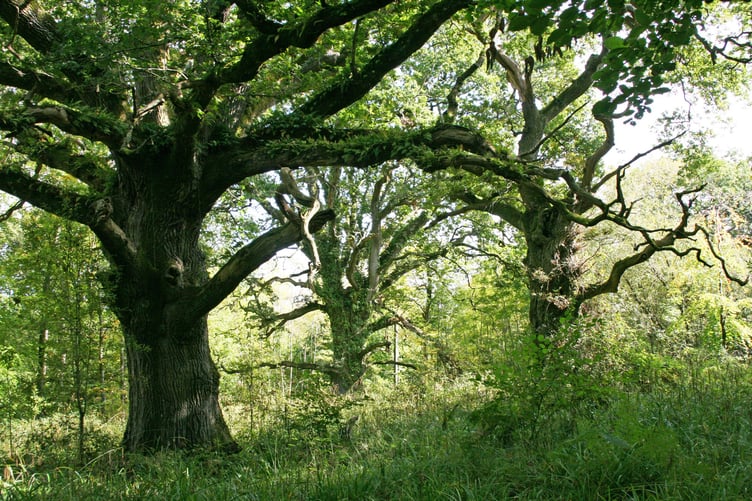

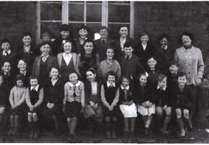


Comments
This article has no comments yet. Be the first to leave a comment.